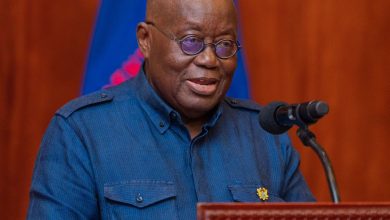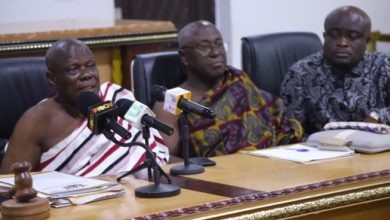E-Levy Case: Your suit is much ado about nothing – Attorney General to Minority

Parliament.
In his 37-page response, the Attorney General, sums up his argument noting that: “At the material time of the passage of the E-levy Bill on 29 March 2022 in Parliament, the provisions of the 1992 Constitution in relation to quorum for decision making were satisfied. The Plaintiffs are not entitled to any relief endorsed on their writ”.
In essence, the AG, says the application by the Minority member of parliament is a lot of fuss about a law that has been passed by the 8th Parliament in a lawful manner.
Godfred Yeboah Dame, cited 24 cases to support his argument and also made reference to the 1992 Constitution of Ghana, Evidence Act, 1975 (Act 323), Supreme Court Rules, 1996 (CI 16) and the Electronic Transfer Levey Act, 2022 (Act 1075).
AG’s legal Arguments
In his legal arguments on the merit of the application, the AG noted that there is no cause of action accruing to the applicants because the subject matter of the suit is covered by Parliamentary privilege.
“Respectfully, the Court will note, upon a careful consideration of the facts of this case, that the plaintiffs do not make a claim that Act 1075 was made in excess of the powers conferred on Parliament or any other authority or person by law or under the Constitution”.
“In effect, the plaintiffs’ suit does not invoke article 130(1)(b) of the Constitution. No argument is advanced by the plaintiffs to hint at a suggestion they mean to say that Parliament enacted a law in excess of its powers under the Constitution”.
“Plaintiffs do not allude to a single provision of the Constitution or any other law by which they can be understood as contending that Parliament enacted a law in excess of powers conferred upon it by the Constitution or by any law”.
“Further, the plaintiffs do not allege that Parliament violated the mode of exercising legislative power spelt out under article 106 of the Constitution. In fact, article 106 does not even feature at all throughout the statement of case of the plaintiffs”.
“On the contrary, plaintiffs’ suit is simply about an enforcement of a previous decision of the Court (Justice Abdulai versus Attorney General) and purport to raise questions about the internal procedure embarked upon by Parliament for the conduct of proceedings in Parliament on a particular day – 29th March 2022” the AG said.
“It is our humble submission that by dint of long settled authorities in the courts of Ghana as well as mandatory provisions in the Constitution, 1992, the courts do not question the conduct of proceedings in Parliament, save and except where the proceedings border on a violation of the Constitution or a law of Ghana”.
“Thus, the courts can question the constitutionality or legality of a decision of Parliament, but the courts do not extend their writs to inquire into what happens in Parliament or how proceedings are conducted in Parliament”.
“It is again pertinent to point out that the plaintiffs, sadly, did not at all address the very fundamental issue germane to the validity of the instant action, i.e. whether the instant suit infringes the age-old principle in constitutional law of Parliament’s privilege over its proceedings”.
“They simply went silent on that issue. Nowhere did they examine the effect of this long-established doctrine on their case. In our submission, the Court is not assisted to a great extent by this palpable failure of plaintiffs”.
“We will however call the attention of the Court to an examination by the courts of Ghana of these all-important principles” the Attorney General, Godfred Yeboah Dame further stated.
The Attorney General ends his legal arguments by stating that: “Respectfully, it is quite obvious it is not the case where plaintiffs contend that Act 1075 was enacted in excess of the powers of Parliament”.
“This allegation would have involved a demonstration that a specific provision of the Constitution which curtails the power of Parliament to pass a specific law has been violated. Examples of such provisions are articles 3(1), 4(1), 106(2), 106(3), 107 and 108 of the Constitution”.
“We humbly submit that the foregoing illustrates that the plaintiffs’ case is devoid of genuine cause of action and should be dismissed” the AG said in his conclusion.
No constitutional breach
In response to the claims of the applicants that the 1992 constitution was breached during the passage of Act 1075, the AG indicated as follows:
“Respectfully, we further submit that, assuming without admitting that there was a walk out by the minority of Parliament before the decision to approve the E-Levy Bill was taken, at the time of that decision, the quorum requirement as provided in article 104(1) of the 1992 Constitution of Ghana was satisfied, as there were at least 137 members of the majority present in Parliament”.
“Apart from Hon. Sarah Adwoa Safo, all the other 137 members of the majority were present in the Chamber. This, having regard to the peculiar situation Parliament found itself in on the 29th day of March 2022, constituted half of the membership of Parliament required by article 104(1)”.
“We make this submission because by Tuesday, 29th March 2022, the number constitutionally required for a decision to be made by Parliament was 137 and not 138, there being only 274 validly elected Members of Parliament” the AG further stated.
“The records show that the election of the Member of Parliament for Assin-North had been cancelled by the High Court, Cape Coast and an appeal by the affected Member of Parliament struck out by the Court of Appeal on 22nd March 2022”.
“It is submitted that the quorum requirement stipulated in article 104(1) of the Constitution does not result in a specific number – 138- as the plaintiffs seek to contend before the Court”.
“Same is reckoned based on the number of validly elected members of Parliament the nation has at every material point in time. This further implies that the quorum required for decision making is not static but dependent on the number of validly elected members of Parliament the country has at a material point in time”.
“The only caveat is that, article 93 enjoins a Parliament of not less than 140 members, implying that the number required by the Parliament of Ghana, for purposes of article 104(1), may even be 70 at a particular point in time” Godfred Dame added.
Background
Three senior members of the National Democratic Congress filed a writ on 30 March, 2022 asking the Supreme Court to declare the passage of the Electronic Transfer Levy Act as unconstitutional and should therefore be set aside.
On 19 April, 2022, the three Members of Parliament followed up with an application for an order of interlocutory injunction to restrain the enforcement of the Act pending the determination of their suit.
A seven-member Supreme Court panel, presided over by Justice Nene Amegatcher, on the 4 May 2022, dismissed the application for interlocutory injunction that sought to stop the government and the Ghana Revenue Authority (GRA) from implementing the E-Levy.
Reliefs sought
Minority Leader in Parliament, Haruna Iddrisu, and two other MPs, Mahama Ayariga and Samuel Okudzeto, in their suit filed at the Supreme Court, are seeking 9 reliefs:
First, “A declaration that on the authority of the Supreme Court case of Justice Abdulai v Attorney-General, Writ Np. J1/07/2022 (hereinafter referred to simply as Abdulai v Attorney General) dated 9th March, 22022, the constitutional quorum for decision-making and voting in Parliament within the meaning and intent of Article 104(1) of the 1992 Constitution is 138 Members of Parliament present in the Chamber of Parliament out of the 275 Members of Parliament; and not 136 Members of Parliament present in the Chamber of Parliament”;
Second, “A declaration that in accordance with Article 104(1) of the 1992 Constitution of Ghana and on authority of Abdulai v Attorney General, on 29th day of March 2022, when the Rt. Hon. Speaker of Parliament put the question for the second reading of the Electronic Transfer Levy Bill, 2021, Parliament lacked the required quorum to vote on the motion before the House, there being only 136 Members of Parliament present in the Chamber of Parliament”;
Third, “A further declaration that by reason of relief (b) above, the purported vote on the motion for the second reading of Electronic Levy Transfer Levy Bill, 2021 by the 136 Members of Parliament is in contravention of Article 104(1) and therefore null, void and of no effect whatsoever”;
Fourth, “A declaration that in accordance with Article 104(1) of the 1992 Constitution of Ghana and on authority of Abdulai v Attorney-General, on 29th day of March 2022, when the Rt. Hon. Speaker of Parliament put the question for the Consideration of the Electronic Transfer Levy Bill, 2021 to the house, Parliament lacked the required quorum to vote on each clause of the Electronic Transfer Levy Bill, 2021 before the House”;
Fifth, “A further declaration that on account of relief (d) above, the purported vote by the 136 Members of Parliament on each clause of the Electronic Transfer Bill, 2021 is in contravention of Article 104(1), and therefore null, void and of no effect whatsoever”;
Sixth, “A declaration that in accordance with Article 104(1) of the 1992 Constitution of Ghana and on the authority of Abdulai v Attorney General, on the 29th day of March 2022, when the Rt. Hon. Speaker of Parliament put the question to the house for the Third Reading of the Electronic Transfer Levy Bill, 2021, Parliament lacked the required quorum to pass the said Electronic Transfer Bill, 2021”;
Seventh, “A further declaration that on account of relief (f) above the purported Third reading and subsequent passage of the Electronic Transfer Levy Bill, 2021 is in contravention of Article 104(10 of the Constitution, and is therefore null, void and of no effect”.
Eighth, “An order of the Honourable Court setting aside the purported passage of the Electronic Transfer Levy Bill, 2021, by the 136 Members of Parliament of the Majority Caucus present in the Chamber of Parliament on the 29th March 2022 as being unconstitutional, null and void”;
Lastly, “Any other relief and/or order(s) the Honourable Court may deem fit”.





